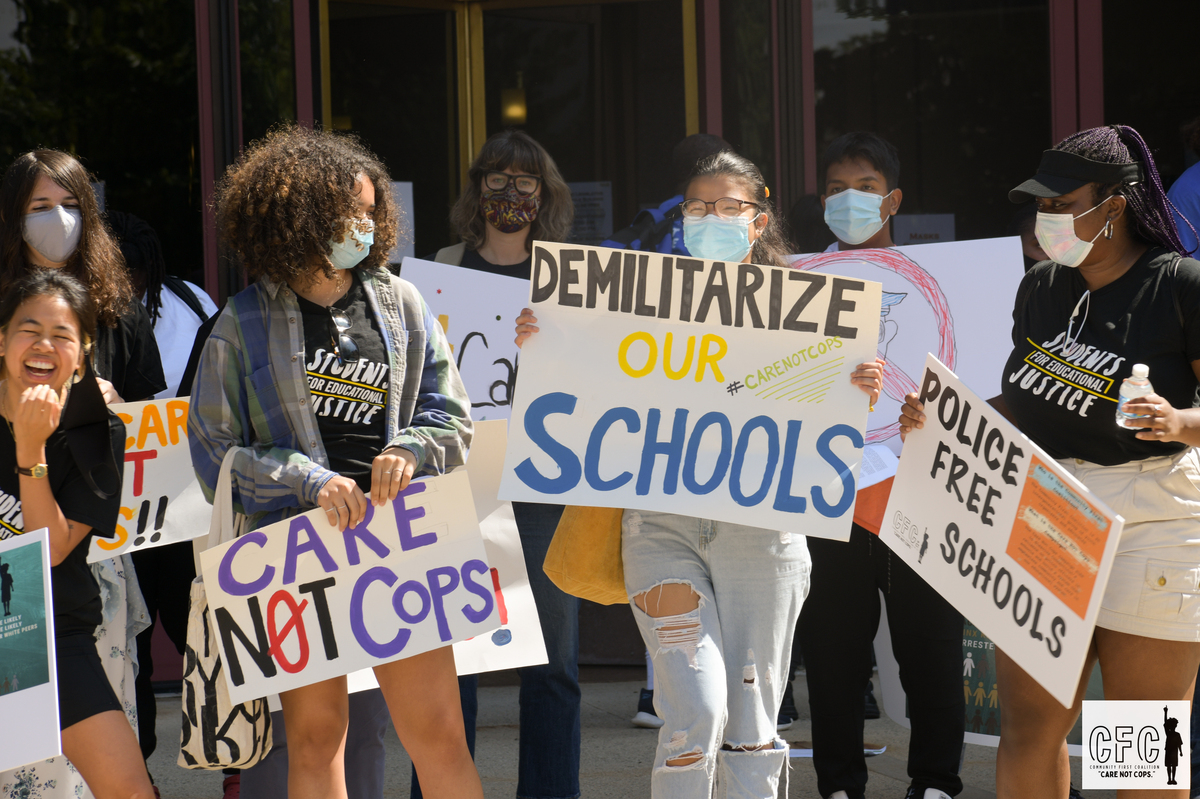New Haven students share personal experiences with “carceral culture” in schools
Youth-led New Haven activist organization hosts an online panel to discuss different facets of the school-to-prison pipeline and advocate for an end to NHPS’s contract with police.

Sarah Cook, Contributing Photographer
New Haven students shared personal experiences with different facets of the school-to-prison-pipeline in an online webinar held on Oct. 28. They advocated to dismantle a “culture of policing” in schools.
The event was hosted by Students for Educational Justice, or SEJ, a youth-led organization that works to combat “institutionalized, interpersonal, and internalized racism and anti-Blackness” within school systems, per the group’s website.
Thursday’s panel in particular was part of a SEJ campaign called “Students over SROs,” an effort aiming to remove school resource officers from New Haven Public Schools and instead invest associated funds into improving in-school mental health resources.
“When I’m having one-on-ones with so many students every week, every month, who go to schools in New Haven … we talk about these things that are preventing them from feeling safe and comfortable and maximizing their ability to learn,” Vy Tran ’21, SEJ’s lead organizer, told the News in an interview after the event. “This isn’t how schools are supposed to be. This isn’t how environments where young people are learning should feel like.”
Tran said that the goal of this event was to spotlight personal stories of a culture of policing within the public school system as part of an effort to make clear that the school-to-prison pipeline is not an abstract or academic concept but a real trend that students in New Haven and across the nation experience regularly.
They added that another major focus was to shift focus from adults to young people. As such, instead of inviting adult experts who have studied the school-to-prison pipeline academically, SEJ chose to seek out current students with personal examples of carceral culture in schools.
Panelists included Brithny Gomez, a freshman at the University of Connecticut; Toni Wright, a current NHPS student who attends Metropolitan Business Academy; Tenille Bonilla of the Connecticut Justice Alliance; and Maxwell Gamboa, who also attends Metropolitan Business Academy.
Kaatje Welsh and Tamara Parks, both students at New Haven Academy, served as the panel’s moderators. Welsh is SEJ’s youth organizer, and Parks is a student intern.
“Ever since I was in elementary school, I can remember specifically Black kids being dragged out of classrooms by the officers as if they were juveniles because teachers didn’t want to deal with them acting out,” Gamboa said. “And this mainly just happened towards the Black and brown kids. I will be honest, there weren’t a lot of white kids, but the white kids at our school got away with a lot of stuff.”
In a previous article, NHPS school resource officer Charles Tyson told the News that school resource officers do not enforce disciplinary rules other than security concerns.
In addition to explicit police presence, the panelists also discussed other elements of school that they said feel criminalizing. Gomez said the dress code in her middle school was not just aimed primarily at female students but also “only really enforced with the brown students.”
She described one particular incident where a teacher punished her for wearing a shirt that was “stuck” and looked like a crop top. “Even though there was a whole bunch of skinny white girls who wore leggings and crop tops every day and no one said anything to them, I got in trouble one time for wearing a crop top,” Gomez said.
The event was part of SEJ’s broader “Students over SROs” campaign, which launched this past summer. The organization aims to pressure NHPS to end its contract with the New Haven Police Department and invest instead into mental health resources. Last April, the Board of Education passed a recommendation that called for schools to keep school resource officers while increasing investments in psychologists and social workers.
Justin Harmon, the NHPS director of marketing and communications, responded to the event and concerns raised on behalf of the district in an email to the News. Harmon wrote that the district respects the students’ testimony. He added that the district is “working to create an environment in which all students feel safe and able to participate fully in school, but we know realistically that we have fallen short of that goal over time.”
“We are working to establish practices of restorative justice because doing so is more effective educationally and because it maintains a better, more humane perspective on rule-breaking, which is seldom criminal,” Harmon wrote. “We do have to try to keep weapons out of school buildings. And any standards of dress should be applied fairly, we agree.”
The “Students over SROs” campaign has also released a survey to NHPS students and alumni to gather more information about student experiences and needs across the district. Tran said the organization will use results from the survey, which is set to close in December, to better inform SEJ’s specific demands of the school system.
SEJ was founded in May of 2017.







